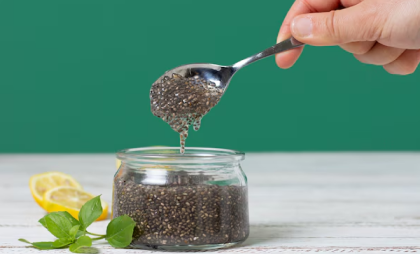
Chia Seeds: Uses, Benefits, Side Effects, and More!
In the ever-evolving world of health and wellness, certain ingredients rise to prominence for their impressive nutritional profiles and versatile uses. Chia seeds, the tiny black seeds from the Salvia hispanica plant, are undoubtedly one of these nutritional superstars. Revered by ancient civilizations like the Aztecs and Mayans for their energy-boosting properties, chia seeds have made a resounding comeback in modern diets. But what exactly makes these little seeds so special? Let's dive into the uses, benefits, potential side effects, and more!
What are Chia Seeds?
Chia seeds are small, oval-shaped seeds that can be black, brown, white, or grey. They are hydrophilic, meaning they absorb many times their weight in liquid, forming a gel-like consistency. This unique property is key to many of their uses and health benefits. Historically, they were a staple food and energy source for ancient Mesoamerican cultures, with "chia" meaning "strength" in the Mayan language.
Nutritional Powerhouse:
Don't let their size fool you – chia seeds are incredibly nutrient-dense. A single tablespoon (approximately 12 grams) packs a significant punch:
- Fiber: A fantastic source of both soluble and insoluble fiber, crucial for digestive health.
- Omega-3 Fatty Acids: Rich in ALA (alpha-linolenic acid), a type of omega-3 fatty acid that has been linked to heart health.
- Protein: A good source of plant-based protein, essential for building and repairing tissues.
- Antioxidants: Loaded with antioxidants that help fight free radicals and protect against cell damage.
- Minerals: Contain essential minerals like calcium, phosphorus, magnesium, and manganese, vital for bone health, energy production, and various bodily functions.
Versatile Uses of Chia Seeds:
One of the great things about chia seeds is their versatility in the kitchen. Here are just a few ways to incorporate them into your diet:
- Chia Pudding: The most popular way to enjoy chia seeds! Simply soak them in milk (dairy or non-dairy) or juice with your favorite sweeteners and flavorings. They thicken into a delicious and nutritious pudding.
- Smoothie Booster: Add a tablespoon or two to your smoothies for an extra boost of fiber, protein, and omega-3s.
- Oatmeal and Yogurt Topping: Sprinkle chia seeds on your oatmeal or yogurt for added texture and nutrients.
- Baking Ingredient: Incorporate chia seeds into bread, muffins, and pancakes for added fiber and a slightly nutty flavor. They can also be used as an egg substitute in vegan baking (chia egg).
- Thickening Agent: The gel-forming property of chia seeds makes them a great natural thickener for jams, sauces, and soups.
- Salad and Cereal Topping: Sprinkle them over salads or breakfast cereals for a subtle crunch and nutritional boost.
- Chia Seed Drink: Mix chia seeds with water and lemon or lime juice for a refreshing and hydrating drink, often enjoyed in warmer climates.
Impressive Health Benefits of Chia Seeds:
The rich nutritional profile of chia seeds translates to a wide range of potential health benefits:
- Supports Digestive Health: The high fiber content helps promote regularity, prevent constipation, and supports a healthy gut microbiome.
- May Promote Heart Health: The omega-3 fatty acids, fiber, and antioxidants in chia seeds can contribute to lower blood pressure, reduced inflammation, and improved cholesterol levels.
- May Help Regulate Blood Sugar: The fiber content can slow down the absorption of sugar, potentially helping to stabilize blood sugar levels.
- Supports Weight Management: The combination of fiber, protein, and the gel-forming ability can promote feelings of fullness, potentially aiding in weight management by reducing overall calorie intake.
- May Improve Bone Health: The presence of calcium, phosphorus, and magnesium contributes to maintaining strong and healthy bones.
- Rich in Antioxidants: The antioxidants in chia seeds help protect the body against oxidative stress and may reduce the risk of chronic diseases.
- May Boost Energy Levels: Historically used for energy, the balanced nutrients in chia seeds can provide sustained energy release.
Potential Side Effects and Precautions:
While generally safe for most people, it's important to be aware of potential side effects and take necessary precautions:
- Digestive Issues: Due to their high fiber content, consuming large amounts of chia seeds, especially without adequate hydration, can lead to bloating, gas, and abdominal discomfort. Start with a small amount and gradually increase your intake.
- Choking Hazard: Dry chia seeds can swell and become sticky quickly. It's advisable to mix them with liquid before consumption, especially for individuals with swallowing difficulties.
- Blood Thinning: Chia seeds contain omega-3 fatty acids, which can have a mild blood-thinning effect. Individuals taking blood-thinning medications should consult their doctor before consuming large amounts of chia seeds.
- Allergies: While rare, chia seed allergies can occur. Symptoms may include skin rashes, hives, and digestive issues.
- Potential Drug Interactions: Consult your doctor if you are taking medications for diabetes or high blood pressure, as chia seeds may interact with these medications.
How to Incorporate Chia Seeds into Your Diet:
The key to enjoying the benefits of chia seeds is moderation and proper preparation. Here are a few tips:
- Start Small: Begin with 1-2 tablespoons per day and gradually increase as tolerated.
- Hydrate Well: Drink plenty of water, especially when consuming chia seeds, to aid digestion and prevent constipation.
- Soak Them: Soaking chia seeds in liquid for at least 10-15 minutes makes them easier to digest and unlocks their gel-forming properties.
- Listen to Your Body: Pay attention to how your body reacts and adjust your intake accordingly.

